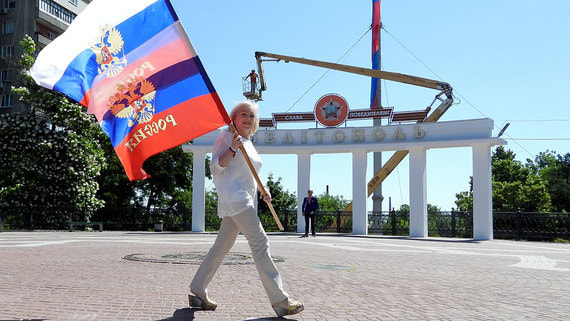Zaporizhia region signed the referendum
[ad_1]

The head of the pro-Russian military-civilian administration of the Zaporozhye region of Ukraine, Yevhen Balitsky, signed an order to hold a referendum on the region’s accession to the Russian Federation. The document was signed at the forum of the public movement “We are with Russia” in Melitopol, Balitsky said in his Telegram channel. The draft resolution with the proposal was read to the participants of the event.
“The resolution was unanimously supported by the participants of the forum, which was attended by more than 700 delegates. I have signed an order from the Central Election Commission of the Zaporozhye region to start working on the issue of organizing a referendum on the reunification of the Zaporozhye region with the Russian Federation,” Balitsky wrote.
The exact date of the referendum is not specified in the resolution.
In mid-July, a member of the main council of the military-civilian administration of the region, Vladimir Rogov, told RIA Novosti that it could take place as early as early September. Andrey Klishas, the head of the Federation Council Committee on Constitutional Legislation and State Building, also admitted this possibility: on July 28, he said that “the most important task of the autumn session of parliament this year will be the integration of new territories into the legal space of the Russian Federation.”
The referendum will be able to take place after the entire Zaporozhye region comes under the control of Russian troops, Vladimir Dzhabarov, First Deputy Chairman of the Federation Council Committee on International Affairs, told Parliamentary Gazeta on August 8. According to him, “this statement of the head of Zaporozhye is a statement for the near future.”
On the air of the radio station Komsomolskaya Pravda, Rogov, after announcing the signing of an order to hold a referendum, said that voting would take place offline, and the possibility of online participation was also being considered. “Everything works out. We will have a voting format that is quite understandable to people. We will not conduct any experiments. Regarding electronic voting, we are thinking about it now, we are looking to make it technically possible to carry out all this,” he said.
However, according to the interlocutor of Vedomosti, who is close to the administration of the President of the Russian Federation, it was not planned to conduct online voting until the last moment during the referendum on the annexation of new territories to the Russian Federation.
Representatives of the military-civilian administration of the Kherson region of Ukraine also declared their readiness to join Russia, in particular, on June 6, its head Volodymyr Saldo spoke about this. So far, official documents on the preparation of a referendum in this territory have not been released.
The electoral legislation that will be used in the referendum in the Zaporozhye region will partially be a copy of the Russian one, argues lawyer Anton Rudakov. “They will partially use the methodology that was tested during the Crimean referendum,” the expert believes. In Crimea, according to another source close to Staraya Ploshchad, Russian specialists, including political technologists and members of the Central Election Commission (CEC), worked to organize polling stations for the referendum so that as many people as possible would come to them.
According to Rudakov, in connection with the hostilities, the details of the procedures and the timing of the upcoming vote have not yet been announced. “I think that they will not designate any specific dates or conditions, while at the level of declarations,” Rudakov added. The lawyer also recalled that earlier the CEC held a seminar-meeting in Rostov-on-Don for representatives of the DPR and LPR. As Kommersant reported on July 5, within the framework of the meeting, consultations were held for employees of the election commissions of these republics recognized by Russia.
At the disposal of the administration, we are talking only about preliminary preparations for the referendum, said Alexander Ignatov, executive director of the Russian Public Institute of Electoral Law. “If you remember, as was the case with Crimea, there was a provision that was approved by the representative body of Crimea and Sevastopol, and on its basis, the election commissions organized the referendum process,” Ignatov said. The expert also added that the CEC can only provide advisory assistance in the preparation and only if contacted.
On July 31, Rogov announced that the authorities of the Zaporozhye region intend to ask the Central Election Commission of Russia for help in organizing and holding a referendum. “Now, I think, we will officially apply to the Central Election Commission of Russia – and not just in terms of consultations, but in terms of providing us with assistance on how everything should sound right so that we are heard by big Russia,” then Rogov told TASS. Deputy Chairman of the CEC Nikolai Bulaev told Vedomosti that the CEC interacts with dozens of commissions from different countries and subjects.
With the Zaporozhye region, according to him, cooperation takes place “in the part in which we interact with other subjects.” “We meet, discuss problems and share experience in solving them. We invite you to our events. Representatives of election commissions from Zaporozhye, Lugansk, Donetsk, and other regions took part in some events,” Bulaev said.
[ad_2]
Source link








